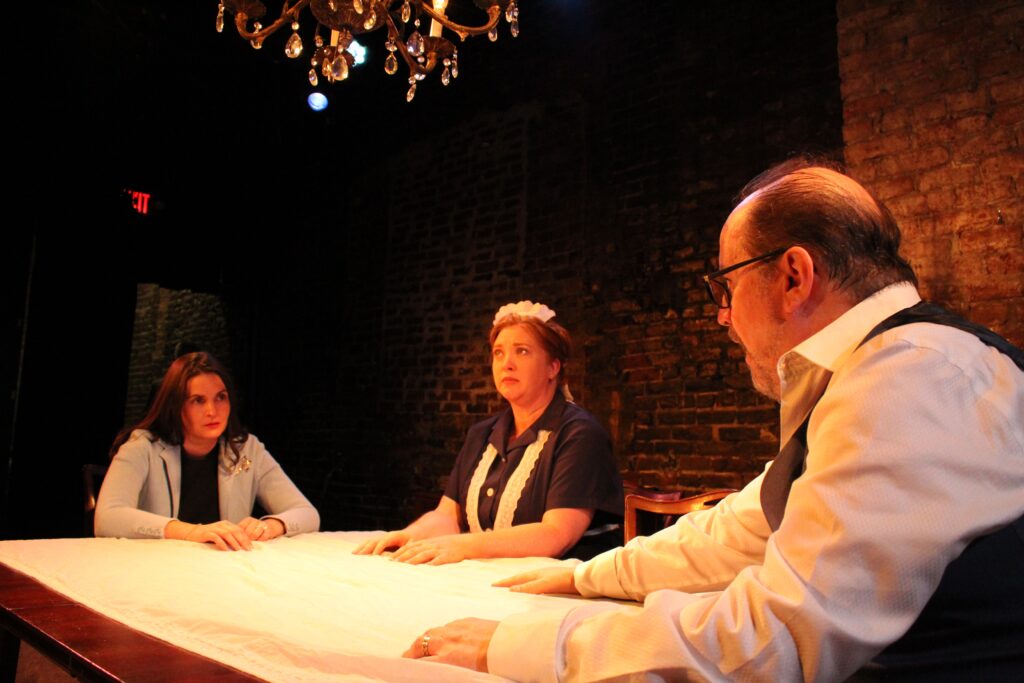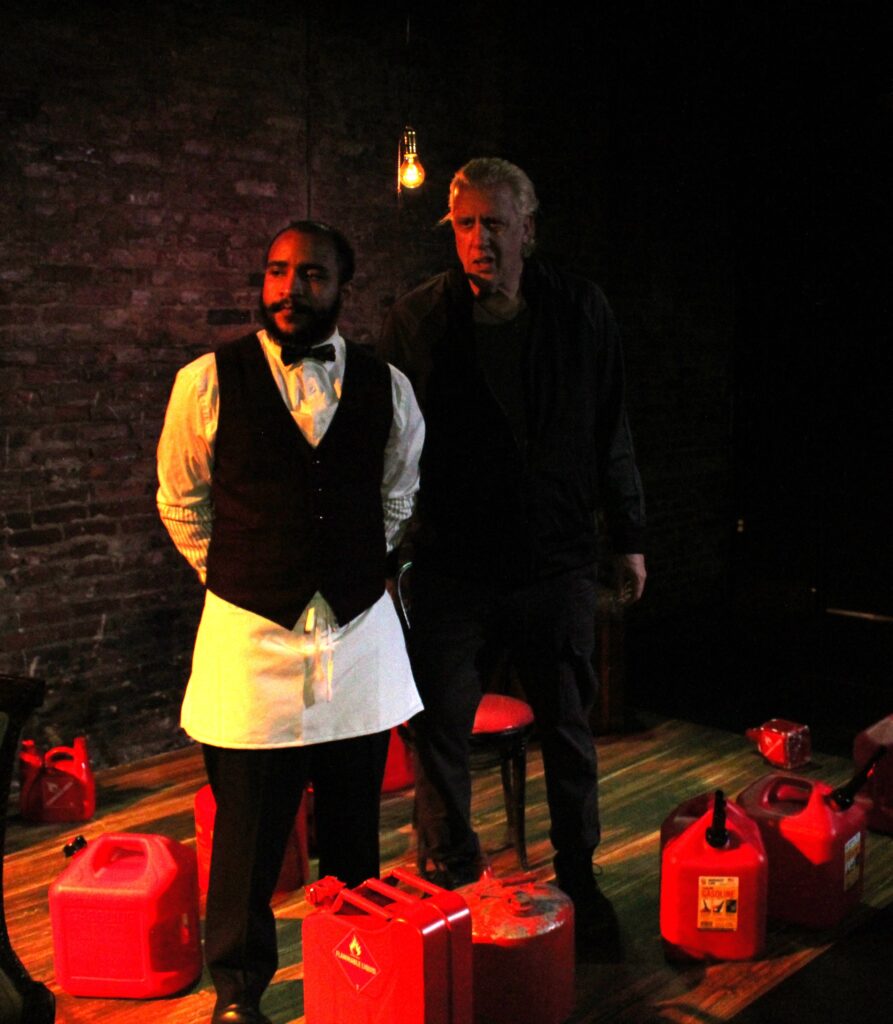
Left to right: Julia Trueblood. Stephanie Charlton, and Kim Carrell
Praxis Stage presents The Arsonists
Written by Max Frisch
Translated by Alistair Beaton
Directed by Bob Scanlan
Costume Design by Maureen Festa
Lighting Design by Kevin Fulton
Sound Design by Mackenzie Adamick
Dramaturgy by Michael Anderson
The Band:
Guitar and Music Director: David Kurimsky
Vocals/Arrangements: Miss Mary Mac
Guitar: Malachi Connolly
Percussion and Backing Vocals: Benedict Dawn-Cross
Saw: Leigh Calabrese
Sept. 5 – 15, 2024
Chelsea Theatre Works
189 Winnisimmet Street
Chelsea, MA 02150
Critique by Kitty Drexel
CHELSEA, Mass. — The Arsonists is about fascists. This production is decisively, unquestionably anti-fascist (and vehemently anti-MAGA). Gird your loins and buy your tickets accordingly.
Praxis Stage presents Alistair Beaton’s translation of Max Frisch’s The Arsonists, a morality play with a hero who learns no moral. Beaton’s updates Frisch’s original work (previously The Fire Raisers, 1953) with 21st-century language and modern references. Praxis expounds upon Beaton’s work by adding references to the Trump presidency and America’s other political chicaneries. The keen updates appeal to the modern audience member. We can laugh at the absurdity of the play while mourning the state of our political stage.
Playwright Max Frisch is like a Swiss (less problematic) Bertolt Brecht. Brecht is like a German Jean Genet. Genet is a French Frisch. They are male, European playwrights born within 20 years of each other who integrated socio-political issues into their post-modern, absurdish dramas about man’s plight within toxic government systems. They hated Nazis. They took themselves seriously. In the tradition of ultra-serious political theatre, it prattles on past the point of audience comprehension. These playwrights do love the sound of their own voice.
The Arsonists contains themes of tolerance for intolerable acts and the plight of the Everyman to tell the story of a household infiltrated by criminals. Gottlieb Biedermann (Kim H Carrell) is a decent, conscientious man. He loves his wife Babette (Julia Trueblood). He pays his maid Anna (Stephanie Charlton) well and expects her to stay in her place. When Biedermann reads in the local newspaper that arsonists are burning down local homes and businesses, he knows to keep his guard up and criminals out of his home.
But, when two needy strangers, Schmitz (Daniel Boudreau) and Eisenring (Zair Silva), ask to stay overnight in Gottlieb’s house, Gottlieb can’t deny them in good conscience. Once inside, the arsonists begin hoarding containers of gasoline in the attic. Gottlieb and Babette are too polite to see they’ve welcomed destruction into their home. Dramaturg Michael Anderson is the pre-show MC and gives a voice to sensitive artists. Alison Butts, Abby Duell, Jean Dany Joachim, Gabriel Pagan, Jessica Newman smash the 4th wall as the Greek chorus.
The Arsonists isn’t a fluffy affair for the meek. This show is punk as hell and wants you to enlist in the anarchist army to piss off Big Brother and Sister. It’s a primer warning all watchers against the evils of totalitarianism: it shows us how fascists manipulate the public into accommodating fascist acts and, it’s a tutorial on how to recreate fascist scams. It’s up to the viewer to decide which interpretation they see. Our political ambivalence is a green light to civil liberty suicide.
The Greek ensemble had a rough start on Thursday. It took them several beats to find and keep their pace. Their energy drooped because their lines didn’t flow from one to the next. It sometimes seemed like they were in different shows but on the same stage. Once they found their groove, they were off. They connected with us and with each other by establishing individual characters within the ensemble and a cohesive unity as a chorus. The flamey costuming by Maureen Festa took us to Guy Fieri’s Flavortown.

Left to right: Zair Silva and Daniel Boudreau
Kim Carrell and Julia Trueblood are believably gullible as the bougie couple standing on a moral pedestal so high they fall to their knees when it topples over. Zair Silva and Daniel Boudreau play criminals with barely restrained violence and humor. Stephanie Charlton is Anna, the maid; Anna is the only character in the entire show who learns something; she learns that her employers are deeply stupid but otherwise average humans who cannot be trusted with their own lives. (It’s not their fault. Frisch wrote them to be nice, not clever.) Charlton plays Anna with appropriate amounts of frustration and fear.
The dramaturgical work Michael Anderson is expansive and does the necessary but thankless job of bringing the audience up to the intellectual level of the play. In some venues, the playbill is a useful distraction and the dramaturgy a pleasant surprise. In this case, Anderson says the quiet parts out loud. His playbill text “Sources, Arguments, Dilemmas” explains the subtle and obvious themes of the play: civil obedience, normalization bias, thought control, sunken-cost fallacy (with JD Vance as an example of hypocricy), etc. He uses simple words and colorful pictures to explain complicated concepts. He and Praxis have done everything short of reading the program for us to make us understand Frisch’s play. It would be offensive if it weren’t so necessary. They only have one opportunity to reach us, and they aren’t going to reach us all.
A revolution without singing and dancing is not a revolution worth having. The Band led by David Kurimsky opened the performance as late audience members trickled in. Vocalist Miss Mary Mac roused the audience with her strong alto. The band kept tempo as Ms. Mac sang of the proletariat’s plight. They were preparing us for a play for and by the people.
History repeats itself unless you actively circumvent its cycles. At intermission and after the performance, Ms. Mac, music director Kurimsky, the instrumentalists, and the cast sand a spare version of R.E.M.’s “It’s the End of the World As We Know It (And I Feel Fine).” The audience sang, hummed, and tapped our feet to the chorus as the band repeated it over and over. That’s a song dedicated to the resistance if there ever was one. It felt like the cast and band would keep on singing until we received their message: religion, politics, nationalism, capitalism; the world is off kilter.
